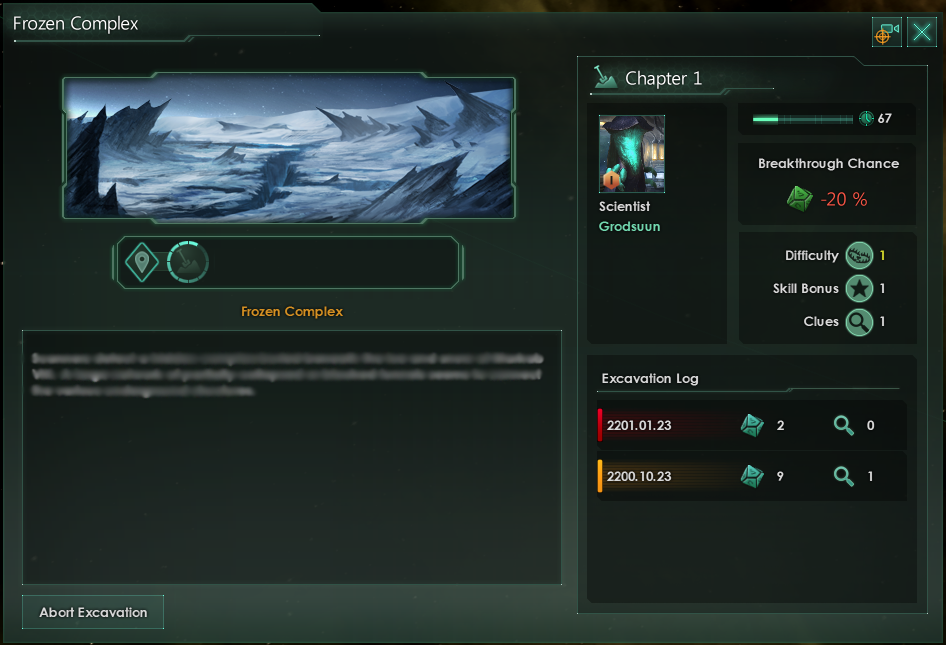Hello everyone!
Today we’re back with yet another dev diary, which will build upon some of the things we revealed last week. Last week we outlined some information about Minor Relics, and how they can be useful. We didn’t mention specifically how they are usually found, but luckily that is something you’ll learn today!
Archaeology
In the next DLC you will be able to experience some new content related to uncovering and excavating archaeological sites. Sites can be discovered in multiple ways, be it either on survey, generated at game start, or perhaps generated by an event.


Excavation in progress. Spoiler-blurred text.
A chapter will be unlocked whenever the Scientist excavating the site gets a successful result at the end of an Excavation Phase – mechanically this works very similar to how sieges work in EU4. As the Scientist goes through phases, it will roll a dice and add modifiers to the result. The final result will then either do nothing, add clues, or make a breakthrough to the next chapter.
Game mechanics details:

Chapter completed. Spoiler-blurred text.
A neat feature of this new system is that you can click previous chapters to go back and read what happened.

Everything is fine.
Archaeology chapters commonly reward the player with minor artifacts – but it can also be resources, research points or other more unique rewards.
Design intentions
Archaeology becomes a way for us to express narrative in a more evolving and controlled manner, and every site it also tied to a location on the map. All of these things together should make it more enjoyable to experience the content, since we hope it becomes easier to build a mental model of what is happening where. In general I believe that having narrative tied to things you can see on the map makes for a better experience. It’s not uncommon for me to forget where on the map a previous event occurred, and that is something I’d like to improve over time. I really like archaeology because it lands well between mechanics and narrative.
------------
We hope you could dig today’s dev diary, and next week we’ll be back with something old that is new.
Today we’re back with yet another dev diary, which will build upon some of the things we revealed last week. Last week we outlined some information about Minor Relics, and how they can be useful. We didn’t mention specifically how they are usually found, but luckily that is something you’ll learn today!
Archaeology
In the next DLC you will be able to experience some new content related to uncovering and excavating archaeological sites. Sites can be discovered in multiple ways, be it either on survey, generated at game start, or perhaps generated by an event.

Sites that lie inside your borders can be excavated by a Scientist, and will consist of several different chapters. A site can have 1-6 chapters, in addition to an introduction/prologue. Each chapter will have its own narrative and a reward, and has to be unlocked before it becomes visible.

Excavation in progress. Spoiler-blurred text.
A chapter will be unlocked whenever the Scientist excavating the site gets a successful result at the end of an Excavation Phase – mechanically this works very similar to how sieges work in EU4. As the Scientist goes through phases, it will roll a dice and add modifiers to the result. The final result will then either do nothing, add clues, or make a breakthrough to the next chapter.
Game mechanics details:
Result = dice roll + Archaeology Skill + Clues - Difficulty
Result Outcomes:
0-7: Status quo
8-10: +1 clue
11-13: +2 clues
14+: Breakthrough
Result Outcomes:
0-7: Status quo
8-10: +1 clue
11-13: +2 clues
14+: Breakthrough

Chapter completed. Spoiler-blurred text.
At the end of each Excavation Phase, it is also possible that the Scientist triggers a random event, which will inject some unpredictability and create opportunities for emergent storytelling.

Everything is fine.
Archaeology chapters commonly reward the player with minor artifacts – but it can also be resources, research points or other more unique rewards.
Design intentions
Archaeology becomes a way for us to express narrative in a more evolving and controlled manner, and every site it also tied to a location on the map. All of these things together should make it more enjoyable to experience the content, since we hope it becomes easier to build a mental model of what is happening where. In general I believe that having narrative tied to things you can see on the map makes for a better experience. It’s not uncommon for me to forget where on the map a previous event occurred, and that is something I’d like to improve over time. I really like archaeology because it lands well between mechanics and narrative.
------------
We hope you could dig today’s dev diary, and next week we’ll be back with something old that is new.




